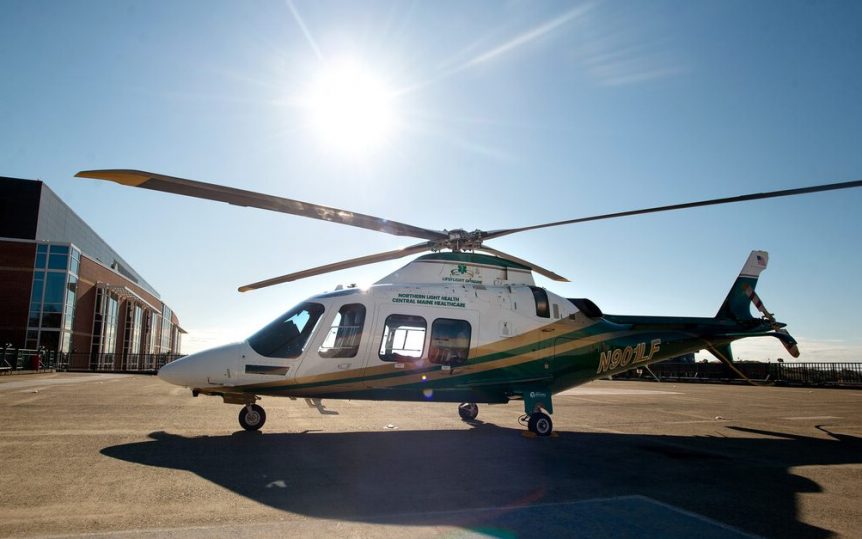The COVID-19 pandemic may be losing some of its deadliness due to widespread free vaccination campaigns throughout the United States. However, that doesn’t stop the staff at LifeFlight of Maine emergency helicopter services from worrying about the near future.
The nonprofit emergency helicopter services provider operates throughout the state of Maine with numerous private and public partners. With its experience, the chopper service already has plenty of experience with COVID-19 patient transport.
Now, however, the organization’s leaders believe that the pressures of a pandemic that still isn’t going away and a medical system that’s still under heavy stress could catch up to everyone. This effect will especially hit the staff and transportation capacities of the 23-year-old agency.
Despite the pandemic’s already long duration of nearly two years, LifeFlight just recently saw one of its worst days so far for COVID transports. This occurred during the Halloween weekend of October 30th to 31st. During these specific days, the agency transported a total of 18 patients who were sick with symptoms of the virus. Of these, 11 were either in respiratory failure or with visible symptoms of the viral condition.
The nonprofit’s staff also explain of worse cases on that day and others, in which LifeFlight would pick a patient up for urgent transportation, take them to a designated hospital, and only then be told that no new beds are available.
Despite vaccination, hospitalizations in Maine remain at high levels and hundreds of new COVID cases are registered per day in the state. Lifeflight’s leadership doesn’t like how this bodes for the future but believes that the organization could still end up being swamped by requests for helicopter transportation.
According to LifeFlight’s executive director, Thomas Judge, the staff at the organization will “have to work hard over the next six months”. Judge also claimed that the organization is urging Maine residents to get vaccinated and to continue wearing masks in certain crowded situations such as gatherings.
These pleas may not fall on fully welcoming ears, however, as many residents approach Thanksgiving and the Christmas months. The largest family gatherings become far more common in these months.
The nonprofit was founded in 1998 and is currently jointly managed by the Northern Light Health service and Central Maine Healthcare. The majority of LifeFlight’s work revolves around flying extremely ill patients and other acute emergency care cases from hospitals in the country or in small towns to major urban medical centers with better equipment and higher staffing.
These transport journeys also sometimes even involve interstate trips. There have been cases where specialized patient care has to be delivered in cutting-edge medical centers in Boston or even as far away as Cleveland, Ohio.
As could be expected, the arrival of COVID-19 made the organization’s missions ever more important. Unfortunately, at the same time, the pandemic saturated many medical services and stretched those of LifeFlight itself as well.
As Judge mentions, “I’ve never seen anything like this in my life. I don’t think anyone in critical care medicine has. I don’t think we’ve ever seen the pace of this.”
Judge also emphasizes that the single most visible commonality among all of the critical COVID patients that the nonprofit transports are their unvaccinated status. These low vaccination levels especially correlate with rural living among the very populations that the nonprofit visits the most.
In Maine and in many other places across the country, a central registry of available and unavailable beds doesn’t exist across all public hospitals. Because of this, the nonprofit’s staff describe how the state’s smaller hospitals often call larger ones to practically begging for extra bed space, only to be rebuffed due to logistical problems.
On more than one occasion, LifeFlight has been called in on such days and rushed patients to other facilities only to be told that no beds could be found for them. Hospitals themselves often can’t get rid of patients who are no longer too ill to leave because calls to nursing homes for spare space also get rejected due to a frequent lack of sufficient staffing.
In Maine as of today, over 230,000 residents remain completely unvaccinated. Judge fears that this number is too large. If even a fraction of this population becomes ill enough with COVID to need urgent medical services, it could badly squeeze the state’s medical facilities and LifeFlight of Maine Emergency Helicopter Services.
Organizations such as Lifeflight often partner with numerous local and state emergency helicopter services authorities to help them with medevac or rescue operations. In other cases, private air charter companies such as Fair Lifts Aviation also offer their helicopter medevac services to both governments and nonprofits throughout the U.S.
Photo Credit: Linda Coan O’Kresik / BDN
